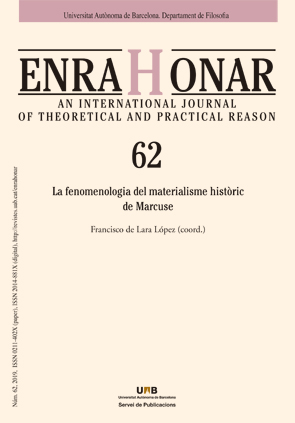Marcuse and Heidegger: Biographical notes from the epistolary
Article Sidebar

Main Article Content
Peter-Erwin Jansen
Hochschule Koblenz | University of Applied Sciences
The following article hopes to contribute to a reconstruction of Herbert Marcuse’s life, specifically with regard to his difficult relationship with Martin Heidegger between 1927 and 1947. Drawing from his unpublished correspondence, currently located in the Marcuse Archive in the University of Frankfurt, this work follows the thread of his intellectual formation in its most significant stages: Marcuse’s first studies, culminated in his work on the German artist novel, his attempt on a Marxian interpretation of Being and Time, the difficulties he found to finish his studies under Heidegger, his enrolment in the Frankfurt Institute for Social Research, his exile from Nazi Germany, and his definitive rupture with Heidegger after the war.
Keywords
biography, Marcuse, Heidegger, unpublished correspondence
Article Details
How to Cite
Jansen, Peter-Erwin. “Marcuse and Heidegger: Biographical notes from the epistolary”. Enrahonar: an international journal of theoretical and practical reason, vol.VOL 62, pp. 21-38, https://raco.cat/index.php/Enrahonar/article/view/351719.
Author Biography